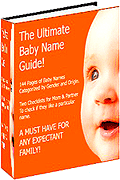Names and Trends - Female Baby Names
Page 2
- Handheld Toys: Baby can now hold onto objects and wave them around. She’s also aware of the differences between her toys. Now is a good time to introduce different textures and sizes of toys that she can use by herself. She’ll love the independence and you’ll notice her hand eye co-ordination greatly improving.
- Varied Music: Now that baby is more aware of her surroundings, you’ll notice that sometimes she’ll prefer to listen to a gentle lullaby, while at other times she’ll want to hear more active music. Introduce a range of music at this stage so that she hears different musical instruments and tunes played at various speeds and volumes.
6 – 9 Months
By the time babies are six to nine months old, they are usually able to sit by themselves and are learning to crawl. Babies will also be learning fine motor skills, such as pinching and grasping objects with just two fingers. At this stage you’ll want to provide baby with a variety of toys to play with in all shapes and sizes to satisfy the growing curiosity and need to explore.
At this stage introduce…
- Reasoning Toys: Baby can now understand that an object is behind something and the idea of nesting objects. Encourage the use of reasoning skills with toys and games that make him think. Be sure to celebrate when he figures them out!
- Physical Development Toys: Encourage baby to use his body in new ways by providing toys that require him to move and stretch. Balls are great because you can make a game of rolling them back and forth, as are toys on wheels that move away from him so he’ll have to chase them.
- Bath Toys: Now that baby can sit up, he’ll begin to be more active during his bath. This is a great time to introduce water toys that encourage baby to learn about water. Squeaky ducks, cups to fill with water and empty again and anything else that is water safe and easy to hold can provide lots of entertainment.
9 – 12 Months
Babies at this stage like to make things happen - they enjoy pushing a button and hearing a song, or seeing something light up. Having the ability to interact with their surroundings is very exciting and once they find something they like, they do it over and over (and over!) again.
At this stage introduce…
- Interactive Toys: Babies can now interact with their toys in a way they weren’t able to before. Anything that responds in some way to baby’s actions or makes a noise will become fast favorites and will teach baby about cause and effect.
- Co-Ordination Enhancing Toys: Babies at this stage are very mobile and enjoy pushing and pulling items. Toys that require them to use their whole body are great for encouraging them to walk. Other favorite games will include stacking items and then knocking them over and filling up an item and then dumping its contents.
- Language Development Toys: Baby is now able to say simple words such as “no” and “dog”. Encourage his growing vocabulary with toys and games that develop language skills. Great options are toys that say words when a button is pushed or videos that focus on language development. Fabric or board books are also good because after reading the story you can give the book to baby to flip the pages and “read” it back to you.
- Role Playing Toys: They watch you and will want to start mimicking the things you do. Toys such as play telephones, brooms, shopping carts and steering wheels will be a big hit and will help baby explore the world of make believe.
Raising a well rounded child requires knowing what stage baby is at and introducing ways for them to grow and develop their minds and skills. Giving baby age appropriate toys will give him or her the best possible foundation for mental and personal growth
About The Author
Jennifer Kirkpatrick is the owner of the online baby store, Pipsqueak Boutique. With its unique collection of baby toys, essentials, music and nursery items it’s a one-stop shop for everything baby. To find products that are suitable for every stage of development, visit http://www.pipsqueakboutique.com.
|
Baby Toys: The Best Choices for Baby’s Development
Back to Page 1
